On December 17, 2024, BTC hit a record high of $108,365. From less than $50,000 at the beginning of the year to a doubling of its price, BTC leads the field of virtual assets and has established a firm foothold on the world stage.
In the past year, Hong Kong has made full preparations for the integration of "old money"; each sub-sector has delivered its own results.
7 virtual asset trading platforms were approved for No. 1, No. 7 and AMLO licenses;
6 virtual asset spot ETFs were listed on the Hong Kong Stock Exchange;
31 securities firms were upgraded to No. 1 virtual asset license;
36 asset management companies were upgraded to No. 9 virtual asset licenses
In the highly-watched RWA track, the Hong Kong government issued more than 6 billion yuan in multi-currency digital green bonds, the HKMA Ensemble Sandbox, the Stablecoin Sandbox, and Ant Digits teamed up with GCL Energy to acquire more than 200 million yuan in photovoltaic physical assets RWA, etc.
However, it cannot be denied that the primary market crypto asset side and the secondary market capital side in Hong Kong have not yet fully ushered in the dawn, and they urgently need to be accelerated and resolved. On the primary market crypto asset side, Hong Kong virtual asset trading platforms are extremely strict in screening crypto assets. Although the high threshold ensures the compliance and stability of the market, it also sets a great obstacle for the entry of emerging assets. On the secondary market capital side, mainland China has not yet opened due to policy restrictions, and the secondary market capital side can only face local and overseas users in Hong Kong; and the user resources in the overseas market have long been seized by platforms such as Binance, OKX and Coinbase, and it is extremely difficult to transfer.
How to find a balance between ensuring market security and promoting innovation in high-quality projects and assets, and attracting the inflow of "old money" that has not yet been involved? This is the core issue of the Hong Kong market in 2025.
In this issue of Bailu Living Room, readers will comprehensively review the development of Hong Kong's virtual asset market in 2024, and explore new opportunities in 2025 from the trends.
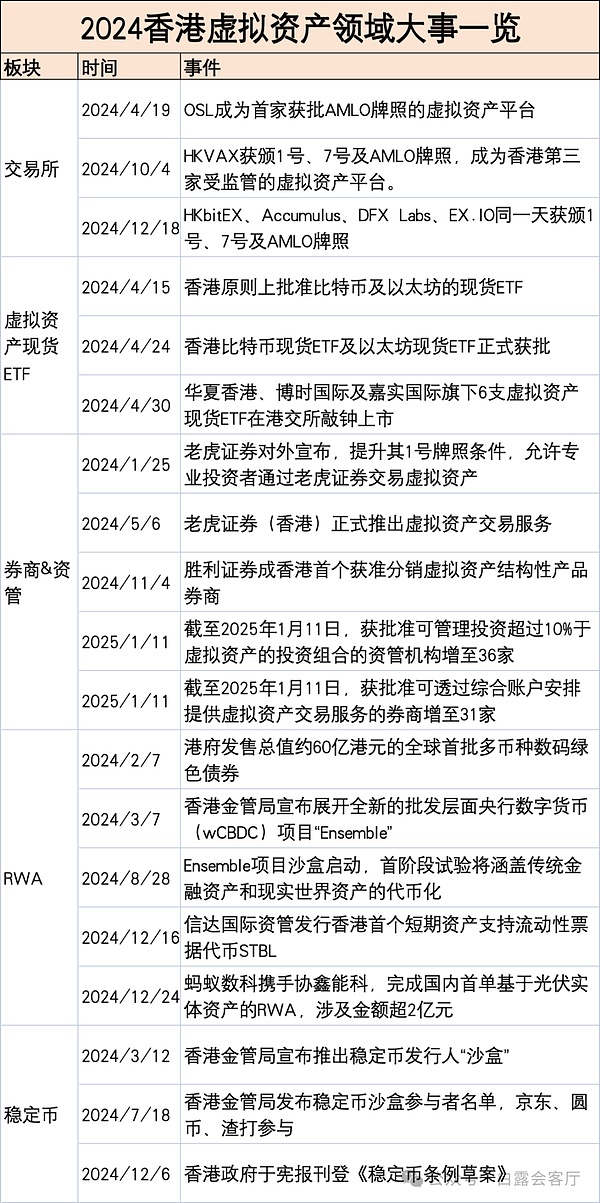
7 Virtual Asset Trading Platforms
As of January 11, 2025, Hong Kong has 7 virtual asset trading platforms that have obtained formal approval from the Hong Kong Securities Regulatory Commission to conduct virtual asset business in Hong Kong in compliance with regulations.
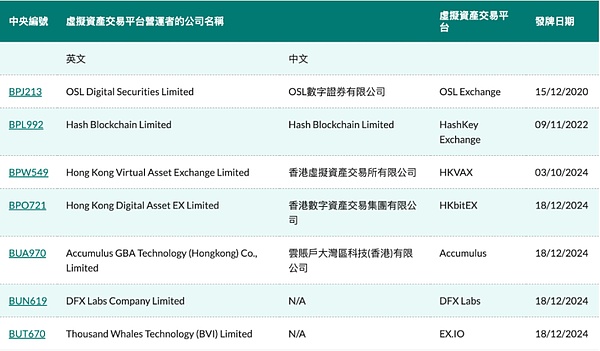
Seven virtual asset trading platforms have been licensed
OSL and Hashkey continue to lead
On April 19, 2024, OSL Group (00863) announced that its wholly-owned subsidiary, OSL Digital Securities Co., Ltd., a digital asset trading platform, which holds a license issued by the Hong Kong Securities and Futures Commission, became the first virtual asset platform approved for a license based on the Anti-Money Laundering and Counter-Terrorist Financing Ordinance (AMLO). In May, Hashkey Exchange followed closely and became one of the first virtual asset service providers in Hong Kong to obtain a full license. The two companies are leading the way and still maintain their advantages in the compliance route.
From a business perspective, Hashkey Exchange has launched HashKey Pro, an institutional-level comprehensive service, to integrate virtual asset trading capabilities for institutions such as ZhongAn Bank and Shengli Securities, with a cumulative trading volume of more than HK$5 billion. As of November 2024, HashKey Exchange's asset management scale exceeds HK$10 billion, with a cumulative trading volume of HK$580 billion. OSL's business is widely deployed in virtual asset spot ETFs and RWAs.
HKVAX comes from behind
On October 4, 2024, the Hong Kong Securities and Futures Commission's official website announced that the Hong Kong Virtual Asset Exchange (hereinafter referred to as HKVAX) was officially approved by the Hong Kong Securities and Futures Commission and issued Type 1 (Securities Trading) and Type 7 (Providing Automated Trading Services) licenses. At the same time, in accordance with the Anti-Money Laundering and Counter-Terrorist Financing Ordinance (AMLO), a "Virtual Asset Trading Platform Operation" license was issued. HKVAX became the third regulated virtual asset platform in Hong Kong.
For more information, please refer to: HKVAX officially obtained a license, becoming the third licensed virtual asset trading platform in Hong Kong
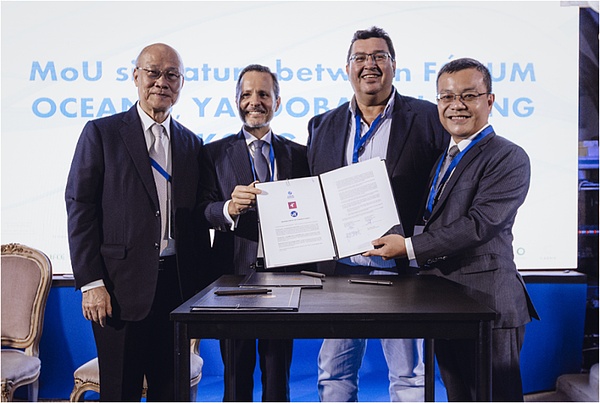
From left to right: Su Shuhui, Chairman of the International Clean Energy Forum (Macao), Carlos Costa, Chairman of Fórum Oceano Pina, Mauricio Marques, founder and CEO of Yacooba Labs, and Wu Weiliang, co-founder and CEO of HKVAX
HKVAX focuses on security tokens (STO) and real asset tokenization (RWA) services. On October 18, 2024, HKVAX signed a memorandum of understanding with Fórum Oceano and Yacooba Labs on the Blue Economy Security Token Project to cooperate on high-quality security token projects related to the European blue economy, covering tokenization, distribution, listing, trading and token custody. On November 29, 2024, HKVAX and Alibaba Cloud reached a strategic partnership, focusing on technical infrastructure, security framework construction, and STO and RWA services. Whether HKVAX, which focuses on RWA, can successfully find its own business incision will continue to be watched by the market.
4 institutions were approved at the same time in December
According to the official website of the Securities and Futures Commission, On December 18, 2024, HKbitEX, Accumulus, DFX Labs, and EX.IO were approved by the Hong Kong Securities and Futures Commission on the same day, and were issued Type 1 (Securities Trading) and Type 7 (Providing Automated Trading Services) licenses, as well as a "Virtual Asset Trading Platform Operation" license in accordance with the Anti-Money Laundering and Terrorist Financing Ordinance (AMLO).
HKbitEX was launched by Hong Kong Digital Asset Exchange Group Co., Ltd., whose parent company is Taiji Capital Group, which includes three major services: capital markets and wealth management, digital asset exchanges, and Web3 SaaS and technology research and development. Gao Han, the founder of Taiji Capital, once worked for the Hong Kong Stock Exchange, and was mainly responsible for promoting the products of the Hong Kong Stock Exchange in the Mainland, including Hong Kong Stock Connect and Bond Connect.
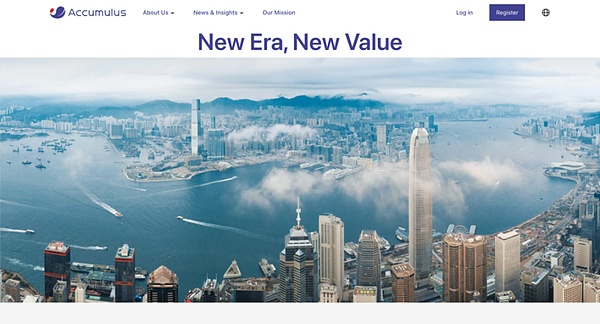
Accumulus is backed by China's top 500 companies and was launched by Cloud Account Greater Bay Area Technology (Hong Kong) Co., Ltd. Cloud Account Hong Kong is registered by Cloud Account and is also the only overseas business headquarters. The group has obtained a RMB 985 million foreign direct investment quota approved by the National Development and Reform Commission and other authorities in the Mainland. According to official introduction, Cloud Account is China's largest online human resources service company, serving a total of 110 million new employment workers (freelancers) from 138 countries and regions. This year, it was selected as one of the "Top 500 Chinese Enterprises in 2024" with a revenue of 108.4 billion yuan.

DFX Labs was the last applicant for the Hong Kong virtual asset trading platform last year, launched by DFX Labs Company Limited. The DFX Labs team is already experienced in the fields of blockchain and financial technology. COO Simon Au Yeung was formerly the CEO of Blockchain Finance and virtual asset trading platform BGE, and the co-chairman of IEEE Hong Kong; CTO David H. has worked for well-known institutions such as Morgan Stanley, Dell Technologies and HashKey Group.
EX.IO was launched by Thousand Whales Technology (BVI) Limited. EX.IO's major investors include Huasheng Capital Group, an Internet brokerage under Sina, as well as Longling Capital and Weixin Jinke Investment. EX.IO was originally named xWhale and was established after the original Web3 trading platform BusyWhale and Huasheng Securities reached a strategic agreement in May last year.
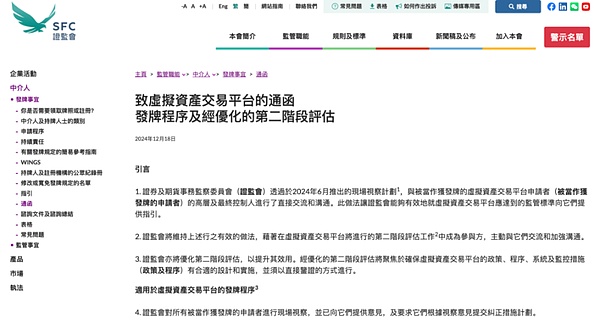
SFC Circular on "Licensing Procedures and Optimized Phase II Assessments"
Same On December 18, 2024, the Hong Kong Securities and Futures Commission issued the "Circular to Virtual Asset Trading Platforms - Licensing Procedures and Optimized Phase II Assessments", providing a clear roadmap for the 11 institutions still waiting in line for license applications; in early 2025, the Securities and Futures Commission will set up a formal advisory group for all licensed platforms, and each licensed institution will appoint its senior staff as representatives, so that the Hong Kong Securities and Futures Commission can fully listen to and consider the views of the institutions, and systematically prioritize development matters based on investor protection. In the new year, more outstanding teams will surely join the ranks of virtual asset trading platforms to drive the market to continue to grow.
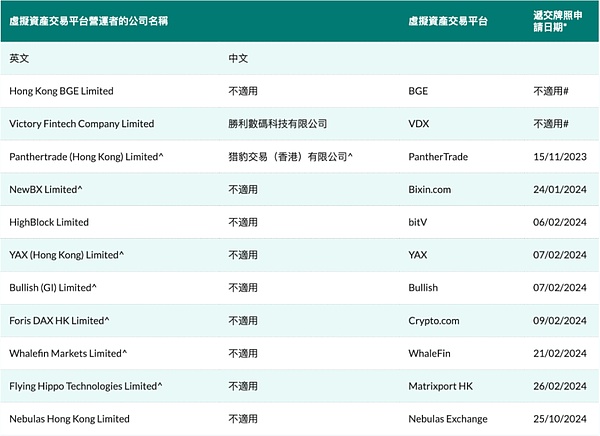
11 virtual asset trading platform applicants still queuing for licenses
Virtual asset spot ETF
It took nearly 10 years for the US Bitcoin spot ETF to be listed; in contrast, the rapid listing of Hong Kong's virtual asset spot ETF has greatly highlighted Hong Kong's determination.
On April 15, 2024, Hong Kong approved in principle the spot ETFs of Bitcoin and Ethereum; on April 24, the Hong Kong Bitcoin spot ETF and Ethereum spot ETF were officially approved; On April 30, 6 virtual asset spot ETFs under China Asset Management (Hong Kong), Bosera International and Harvest Asset Management (Hong Kong) were listed on the Hong Kong Stock Exchange and opened for trading.
For an overview of each participant, please refer to: Approved as early as next Monday! A look at the strength of 7 Hong Kong Bitcoin spot ETF layouters
Unlike the United States, Hong Kong virtual asset spot ETFs support physical redemption, allowing investors to redeem ETF shares by delivering physical virtual assets, rather than just trading in cash. Physical redemption means that the underlying assets do not have to be sold immediately, which brings advantages in cost and liquidity. After the physical subscription and redemption process is completed, investors will be able to directly obtain virtual assets such as Bitcoin and Ethereum corresponding to the spot ETF funds, and their investment options will be more diversified.
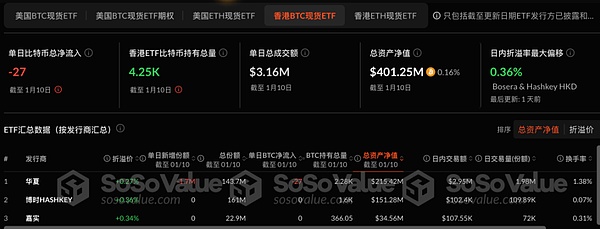

As of January 11, SoSoValue's statistics on Hong Kong Bitcoin Spot ETF and Ethereum Spot ETF
On the first day of trading, the Hong Kong spot virtual asset ETF raised approximately HK$2 billion, with a calculated net asset value of US$293 million. The total trading volume of the six ETFs on the first day was about HK$87.58 million (about US$12.7 million).
As of January 7, 2025, according to data from the Hong Kong Stock Exchange, the total trading volume of Hong Kong's three Bitcoin spot ETFs in 2024 reached HK$5.257 billion; from the perspective of market volume, the US's $129 billion Bitcoin ETF asset management scale accounts for 1.2% of its ETF market, while the same data in Hong Kong is 0.66%, and there is no order of magnitude difference in the proportion between the two.Since its listing, Hong Kong's Bitcoin spot ETF has a net inflow of about 380 BTC, and the total asset management scale has increased by about 66%.
In 2025, under the influence of the world pattern dominated by the United States, the impact of Hong Kong's virtual asset ETF on the local financial market will become increasingly important. Tools like ETFs have the opportunity to encourage more traditional institutions to truly embrace virtual assets; only when "old money" pours in can the liquidity of Hong Kong's virtual asset market undergo a qualitative change.
A large influx of brokerages and asset management
The implementation of ETFs only represents the completeness of the tools; the enthusiasm of brokerages and asset management companies to enter the market reflects the trend of "old money embracing" the Hong Kong market.
Tiger Securities, a high-profile entry
On May 6, 2024, according to Yahoo Finance, Tiger Securities (Hong Kong) officially launched virtual asset trading services; professional investors in Hong Kong can trade 18 virtual assets in one stop through Tiger Trade, the Tiger Securities investment platform.
On January 25, 2024, Tiger Brokers announced that it had obtained the Hong Kong Securities Regulatory Commission to upgrade its Type 1 license conditions, allowing professional investors to trade virtual assets on the Securities Regulatory Commission's licensed platform through Tiger Brokers.
On March 28, 2024, Tiger Brokers (Hong Kong) obtained the Hong Kong Securities Regulatory Commission's approval for a Type 9 license to provide asset management services, which can provide investors with a series of asset management services, including dedicated account services for retail and professional investors, and management of collective investment plans for professional investors.
On May 6, 2024, Tiger Brokers (Hong Kong) officially launched virtual asset trading services, becoming one of the first technology brokers in Hong Kong to support one-stop trading management of traditional securities and virtual assets. When the service was first launched, the commission for virtual asset transactions was as low as 0.2% of the transaction amount, and the custody fee was waived. The competitiveness of the fee rate reflects Tiger Brokers' firm execution in seizing a place in the virtual asset market.
For more details, please refer to: Tiger Brokers Launches Virtual Asset Trading Services in Hong Kong, Officially Entering Web3
Victory Securities, Maintaining First-mover Advantage
Victory Securities, a local brokerage firm in Hong Kong, is a pioneer in the field of virtual assets; thanks to a complete range of compliance licenses, Victory Securities has always maintained a leading position in its business.
On April 23, 2024, Victory Securities announced that it was the only participating securities firm that accepted physical subscriptions in the first batch of Bitcoin and Ethereum spot ETFs in Hong Kong; On October 15, 2024, Victory Securities announced that it had successfully passed the relevant regulatory inquiry procedures on October 10, 2024, and could initiate and manage the Victory VSG virtual asset multi-strategy fund, and the first Web3 multi-strategy compliant fund initiated by a virtual asset investment organizer company licensed by the Hong Kong Securities and Futures Commission, and accepting investors to subscribe to fund units in stablecoins; On November 4, 2024, Victory Securities announced that it had obtained permission from the Securities and Futures Commission to sell cash-settled virtual asset structured products to qualified professional investors, once again becoming the first licensed securities firm in Hong Kong to be approved for this business.
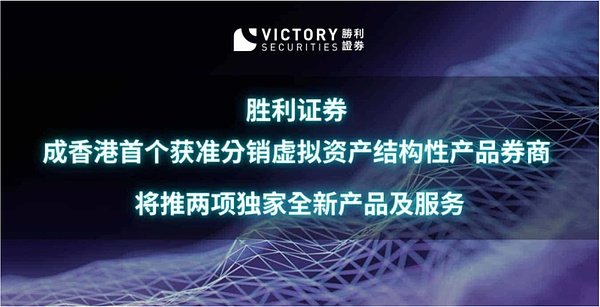
No matter how high Shengli Securities can finally reach in the field of virtual assets, they have already proved with their own experience that the compliance route is always a race against time. The sooner you embrace supervision, the more opportunities you will have to seize the initiative in the market.
31 securities companies and 36 asset management companies are also ready
Tiger Securities and Shengli Securities are representatives of securities companies that remain active in the market and attract high attention. In fact, a large number of traditional and emerging institutions have been awarded virtual asset-related licenses and are ready to start making great strides.
In terms of the number of securities firms, as of January 11, 2025, 31 securities firms have been approved to complete the upgrade of virtual asset No. 1 license and can provide virtual asset trading services through comprehensive account arrangements.
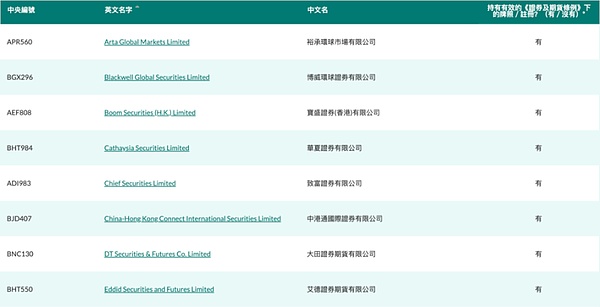
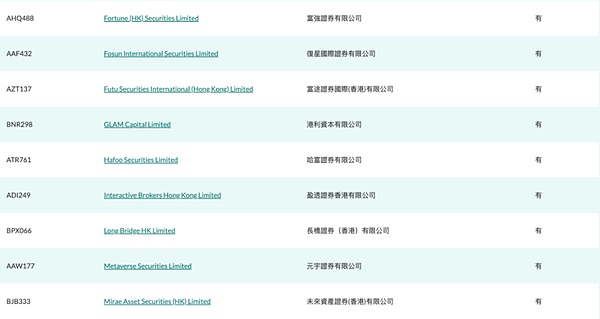
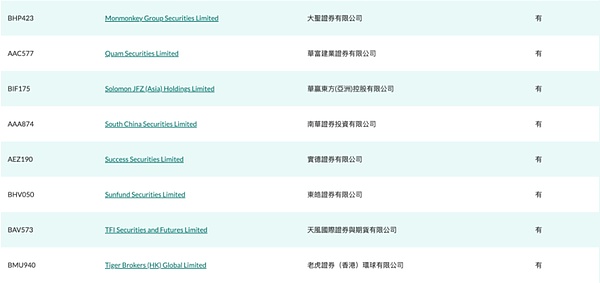
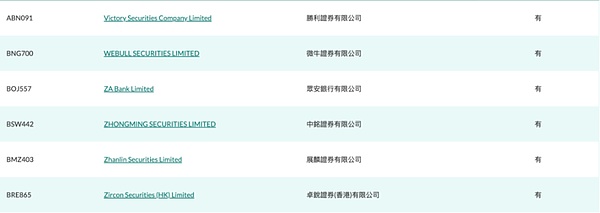
According to the official website of the Hong Kong Securities Regulatory Commission, 31 securities firms have been approved to provide virtual asset trading services through comprehensive account arrangements
In terms of the number of asset management companies, 31 companies have been approved to upgrade their virtual assets in early 2024. According to the 2019 China Securities Regulatory Commission (CPC) Securities Regulatory Commission (SEC), only 11 asset management institutions with a No. 9 license can manage investment portfolios with more than 10% invested in virtual assets; as of January 11, 2025, the number of asset management institutions with the same compliance qualifications has increased to 36.
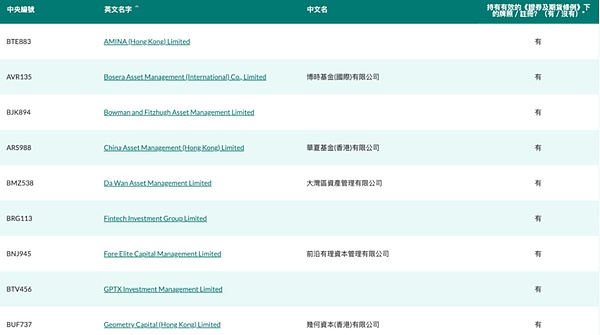
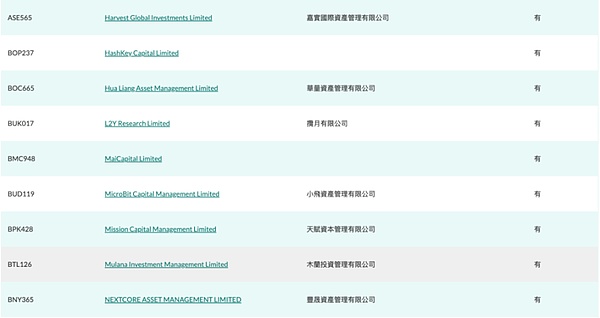
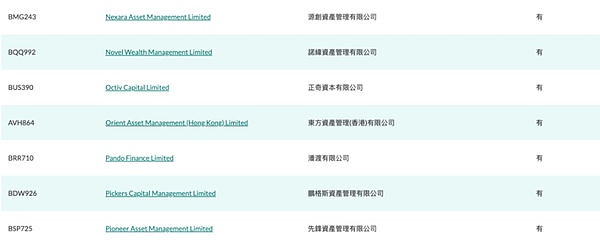
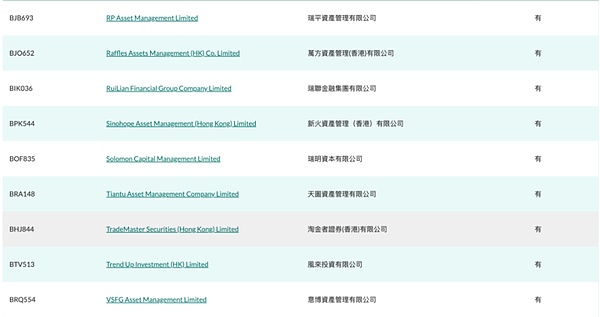

According to the official website of the Hong Kong Securities and Futures Commission, 36 With the launch of virtual asset licenses, Hong Kong's financial institutions are making early preparations for the rapid development of RWA in 2025. From securities firms to asset management, traditional and emerging institutions have built a dual foundation of compliance and technology; on this basis, more and more "old money" has been fully opened to enter the market. Hong Kong's financial ecology is ready to sprint in this wave. RWA, the focus of the next stage of development Breaking the barriers between the virtual world and the real world and allowing assets and funds to flow freely between the two systems is a major trend in the world and the focus of Hong Kong's next stage of development.
The reason why RWA is important is that, on the one hand, it uses blockchain technology to improve transparency and security and solve problems in the traditional financial system; on the other hand, if the market pays for it, it can fundamentally activate more physical assets and attract a wider range of small and medium-sized investors to enter the market, thereby injecting more liquidity into the development of the real industry and the digital economy.
Hong Kong government takes the lead in issuing the second batch of digital green bonds
On February 7, 2024, the Government of the Hong Kong Special Administrative Region of the People's Republic of China announced that it had successfully issued digital green bonds denominated in Hong Kong dollars, RMB, US dollars and euros under the Government Green Bond Program, with a total value of approximately HK$6 billion, which is the world's first batch of multi-currency digital bonds.
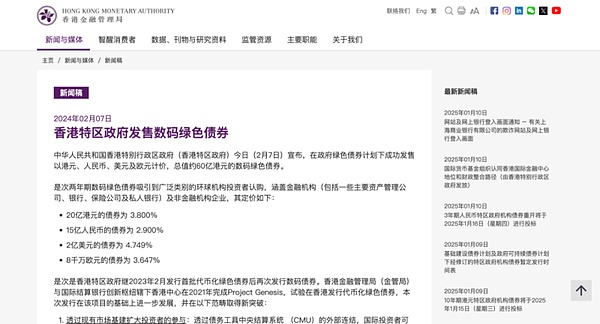
In 2021, the Hong Kong Monetary Authority and the Hong Kong Center under the Bank for International Settlements Innovation Hub completed Project Genesis to test the issuance of tokenized green bonds in Hong Kong. This issuance is a further development on the basis of this project. According to the official news of the HKMA, new breakthroughs have been made in four aspects: expanding investor participation, streamlining the issuance process, introducing standardized elements, and disclosing and integrating digital asset platforms.
As the world's first batch of multi-currency digital bonds, the settlement and delivery of this batch of digital green bonds adopts the CMU system, with HSBC Orion as the digital asset platform. HSBC, Bank of China (Hong Kong), Credit Agricole CIB, Goldman Sachs, Industrial and Commercial Bank of China (Asia), UBS, Allen & Overy, Ashurst & Linklaters LLP all participated in the preparations for the issuance.
Hong Kong Monetary Authority Ensemble Sandbox to Promote Tokenized Applications
On March 7, 2024, the Hong Kong Monetary Authority announced the launch of a new wholesale central bank digital currency (wCBDC) project "Ensemble". The HKMA stated: The project will initially focus on tokenized deposits, that is, commercial bank deposits in digital form issued and provided by commercial banks to the public.
On August 28, 2024, the Hong Kong Monetary Authority held a sandbox launch ceremony for the Ensemble project, announcing that the first phase of the sandbox trial will cover the tokenization of traditional financial assets and real-world assets, and focus on four major themes: fixed income and investment funds, liquidity management, green and sustainable finance, and trade and supply chain financing. Through the trial, the HKMA will verify the technical interoperability between tokenized assets, tokenized deposits and wCBDC, and will also allow industry participants to conduct end-to-end testing of tokenized asset transactions in actual business scenarios.
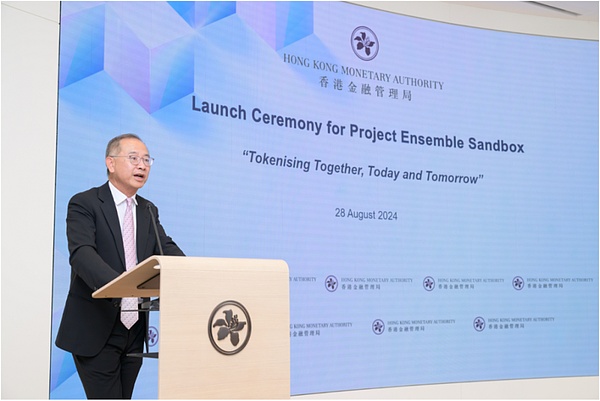
Hong Kong Monetary Authority Chief Executive Eddie Yue delivered an opening speech at the Ensemble Project Sandbox Launch Ceremony
According to the official news from the HKMA, members of the Ensemble Project Architecture Working Group include well-known financial and technology companies such as Bank of China (Hong Kong), Hang Seng Bank, Hashkey Group, HSBC, Standard Chartered Bank, Ant Digital Technology, and Microsoft (Hong Kong).Internationally, the HKMA will explore opportunities for cooperation with the Hong Kong Center under the Bank for International Settlements Innovation Hub on one or more tokenization topics, and work with members of the CBDC Expert Group to promote the development of the sandbox.
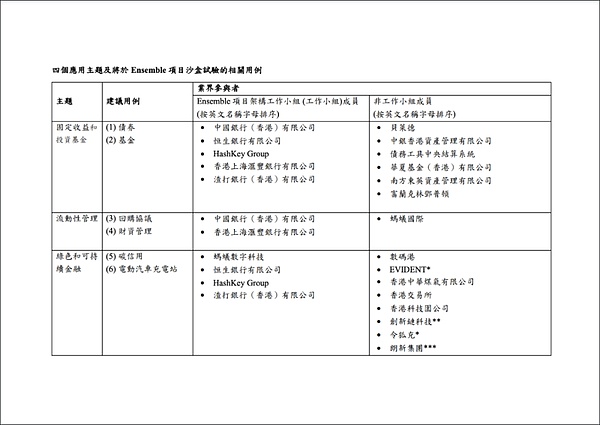
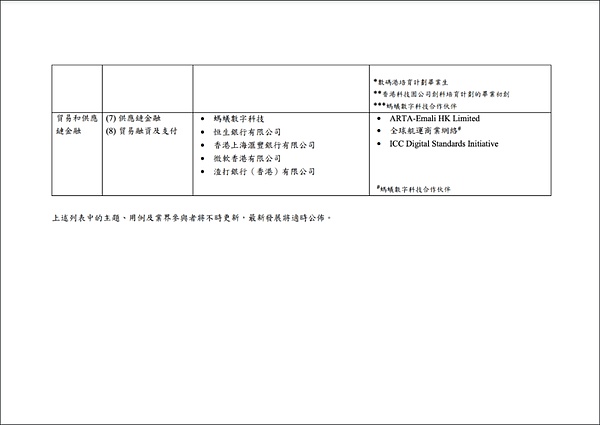
Stablecoin Sandbox and the Stablecoin Bill
Stablecoins are the cornerstone of RWA and the focus of development. As early as January 2022, the Hong Kong Monetary Authority issued a discussion paper on extending Hong Kong's regulatory framework to stablecoins, inviting industry parties to discuss and clarifying the initial direction of the regulatory framework. In January 2023, the Hong Kong Monetary Authority issued a consultation summary of the discussion on crypto assets and stablecoins, elaborating on the expected scope of regulation and major regulatory requirements.
In March 2024, the Hong Kong Monetary Authority announced the launch of the "Sandbox" for stablecoin issuers, allowing the testing of stablecoin issuance within the regulatory sandbox. On July 18, 2024, the Hong Kong Monetary Authority released a list of participants in the stablecoin sandbox: JD.com, Yuanbi, and Standard Chartered became official participants, and the main application scenarios proposed included payment, supply chain management, and capital market use cases, as well as secondary Web3, games, and virtual asset transactions.
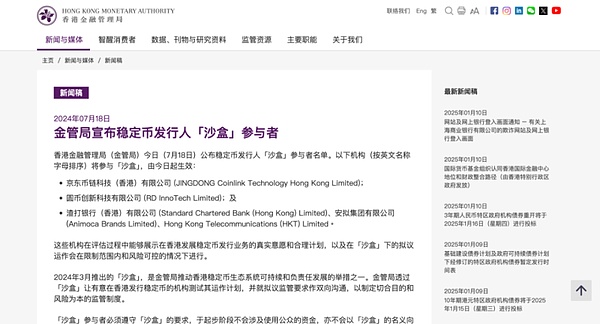
The HKMA stated that the current fund transfer in these scenarios may involve financial institutions, payment service companies, settlement systems, etc. in different time zones. These "middlemen" or financial infrastructures do not operate 24/7, and the fees are quite high and the efficiency is low. Stablecoins can not only play the role of transaction medium, reduce costs and save transaction time, but also use their programmable characteristics to develop a variety of innovative solutions to automate and intelligentize financial service processes, facilitate the flow of funds, and more accurately manage various risks related to transactions.
For more details, please refer to: JD.com, Yuanbi, and Standard Chartered have entered the game. Who will win the Hong Kong Stablecoin "Sandbox"?
On December 6, 2024, the Hong Kong government published the Stablecoin Bill in the Gazette, which aims to improve the regulatory framework for virtual asset activities, address the potential risks posed by fiat-pegged stablecoins, and ensure transparency and consumer protection.
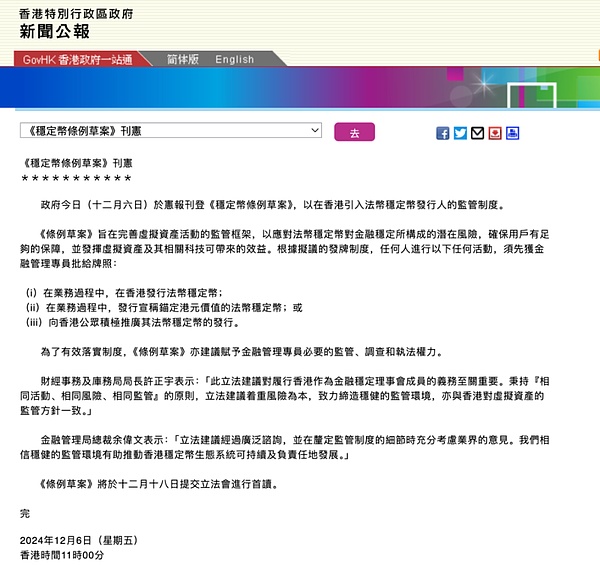
The Stablecoin Bill proposes strict licensing and compliance requirements. Although it helps stabilize the system, it is undeniable that it may also exclude smaller or emerging market participants. Whether start-ups will face difficulties due to high audit fees, strict governance requirements and capital adequacy requirements is a balance that the Hong Kong government must carefully weigh between innovation and security in the future.
China's first RWA for photovoltaic physical assets with a value of over 200 million yuan
On December 23, 2024, China Fund News reported that Ant Digital Technology, together with green energy service provider GCL Energy, successfully completed China's first RWA based on photovoltaic physical assets, involving an amount of over 200 million yuan. Hong Kong Victory Securities also participated.
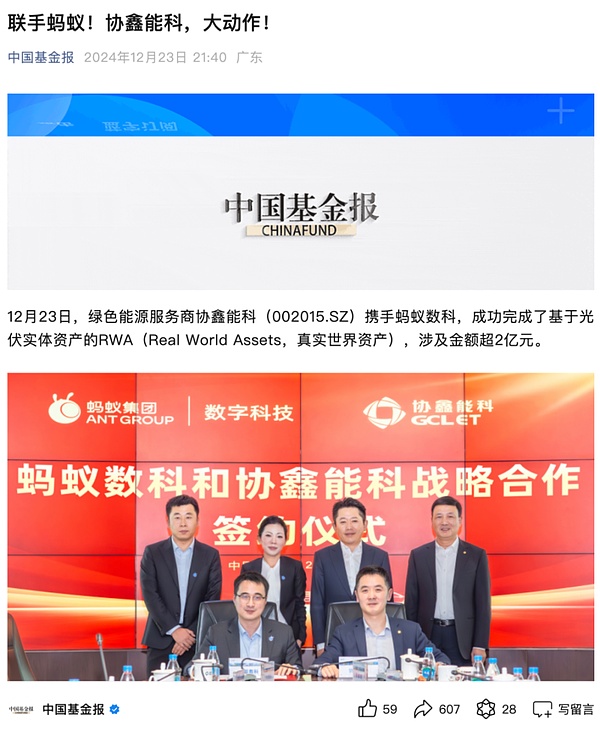
Ant Digital Technology, or Ant Digital Technology, is an independent section of Ant Group's technology commercialization, and will begin independent operations in April 2024. So far, Ant Digital Technology has served more than 10,000 corporate customers with more than 300 partners. GCL Energy Technology Co., Ltd. is a subsidiary of GCL (Group) Holdings Co., Ltd., with its main businesses being digital energy and clean energy. Currently, its subsidiaries have 225 energy experts, 192 software copyrights, 324 patents accepted by its subsidiaries, and 3 national key R&D projects.
GCL Energy will use the 82MW "Xin Yangguang" household photovoltaic power plant located in Hubei and Hunan provinces as the RWA anchor asset, and through the integration of blockchain technology and IoT (Internet of Things) technology, package and store the value, operation, income and other data of household photovoltaic projects on the blockchain to form a digital token. On the day of the issuance, Ant Digital and GCL Energy signed a strategic cooperation agreement in Suzhou. The two parties will carry out comprehensive cooperation in the construction of new power systems, green finance, artificial intelligence and other aspects in scenarios such as distributed photovoltaic power stations, energy storage power stations, and integrated energy services, and continue to explore integration paths for digital industrialization and industrial digitalization.
For more details, please refer to:Ant Digits and GCL Energy completed the issuance of over 200 million yuan of photovoltaic physical assets RWA
Hong Kong's first short-term asset-backed liquidity note token STBL
Hong Kong institutions from all walks of life have also begun RWA experiments. On December 16, 2024, Cinda International Asset Management Co., Ltd. (hereinafter referred to as "Cinda International Asset Management") announced the successful issuance of STBL, a short-term asset-backed liquidity note token arranged by it, on the Ethereum blockchain, becoming the first case of a Hong Kong financial institution arranging the issuance of transferable tokenized packaged reorganized notes. Cinda International Asset Management will serve as the manager of STBL, and NVT will provide blockchain operation services to STBL's blockchain agent and provide technical support solutions for STBL's issuance on the blockchain. GF Securities (Hong Kong) Brokerage Co., Ltd. and HashKey Exchange serve as the first distributors of STBL. Through the tokenization of notes, the issuance and transfer of STBL does not need to rely on third-party intermediaries such as clearing houses. Its issuance and transfer are automatically recorded in real time on the blockchain, and anyone can view and verify the transfer records on the blockchain, thereby improving transparency. Each STBL has a par value of $1 and maintains a stable value. On the monthly dividend date, the accumulated daily interest will be automatically distributed to the wallets of professional investors in the form of newly issued tokens. The STBL manager (Cinda International Asset Management) will publish the average daily yield of its related assets and the underlying MMFs in the previous week on a public website every week.
At the same time, Cinda International Asset Management and HashKey Group are also exploring the possibility of further cooperation in the future, and plan to expand the STBL issuance to the Ethereum Layer 2 network HashKey Chain to continue to expand the investor base of STBL.
Looking forward to 2025
Looking back to 2024, Hong Kong has laid a more solid foundation in the field of virtual assets. From virtual asset trading platforms to spot ETFs, to the booming of RWA, the potential for compliance and innovation is constantly being demonstrated in the Hong Kong financial market.
Looking forward to 2025, with the gradual acceptance of the market by "old money", Hong Kong is expected to accelerate the deep integration of virtual assets and traditional finance. Especially the development of stablecoins and RWA, as long as Hong Kong finds the right balance between ensuring security and promoting innovation, Hong Kong will surely usher in its own golden moment in the global virtual asset market.
 Joy
Joy





























